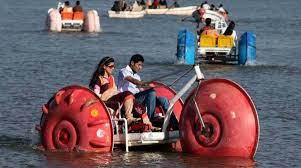Boat riding can be fun-filled and highly rewarding, especially for first-time riders. However, if you are new to the boating world and are looking to rent or buy your first boat, getting things right without professional help can be challenging. Here are a few tips that will elevate your boating experience.
1. Boat Operation Training
Boat riding is a skill that only gets better with time. As a boating newbie, you’ll need to put a lot of practice and effort into mastering the art of launching, boat maneuvering, and docking. If it’s your first time on a boat, consider tagging along an experienced instructor to take you through the basics of boat riding.
If your neighborhood is close to a lake or other large waterbody, there may be multiple boating clubs or memberships in your area. It’s common for marine memberships and boating clubs to offer training and continuous support to all new members.
2. Get Your Boat License and Registration
Each state has requirements that boaters must satisfy before venturing into the sea or lake. To earn your boating license, you must demonstrate your knowledge and skill in vessel operation and safety. Most states require you to attend and complete at least one course on vessel safety and operation.
A typical boat training course will cover basic navigation rules, boating terminologies, and safety equipment usage when out in the water. You can take the training online or from a local boating club. The type of boat you own, where you ride it, and the activities you intend to carry out are some factors you need to consider when seeking boat registration. A quick internet search will reveal the paperwork and costs of acquiring a legitimate boating license across different states.
3. Boating Accessories and Gadgets
Boating gadgets are vital because they improve safety, navigation, and overall ride comfort. Consider using premium quality boat decking materials to ensure your vessel can withstand harsh water environments. Wood, metal, and high-density polyethylene (HDPE) are popular for their structural viability and affordability.
Navigation tools are vital, especially when boat riding at sea or on a large lake. Radar devices, compasses, GPS receivers, stabilizers, and speed and distance logging gadgets are the standard navigation tools you’ll need to get started.
4. Be Mindful of the Weather
Weather patterns and mother nature greatly impact the quality and safety of your boating expedition. The last thing you want as a boating newbie is to get caught out at sea during a storm. It’s always a good idea to consider weather forecasts and schedule your expeditions accordingly to avoid unnecessary risks. However, even with weather forecasts, it helps to know that conditions can change abruptly to your disadvantage. In addition to radio forecasts, use your instincts and judgment to spot potential changes in weather patterns to keep yourself and your vessel safe. The appearance of thick clouds on the horizon and sudden changes in wind direction and speed indicate approaching unfavorable weather. When caught in a storm, reduce boat speed and head to the nearest shore.
5. Prepare a Checklist Before Departure
Planning for your expedition in advance is crucial in dealing with unexpected occurrences such as a boat breakdown at sea. A pre-departure checklist also helps you adhere to all safety rules and precautions necessary to keep everyone safe while out in the water. While checklists can vary between boaters, a typical one should at least include the following items:
- Life jackets
- Fire extinguishers
- Flashlights and distress signals
- Toolboxes
- First aid kits
- Spare batteries
6. Trim Adjustment
Mastering trim adjustment is critical in keeping your boat up and running efficiently. Trimming entails adjusting the boat’s hull as it wades through the water. Good trim adjustment techniques help improve your boat’s fuel consumption and overall performance when cruising out at sea. Trimming can be done manually via buttons on the boat’s dash or automatically through throttle settings.
Boats respond differently to trim adjustments. Try playing around with your boat’s trim adjustment until you find the right spot.
Conclusion
While boat riding is an essential skill to learn, many other factors affect the quality and safety of your boating experience. Remember to follow these tips and tricks, and even maybe pick up a few while you are on the water.



















